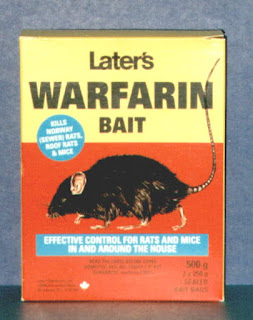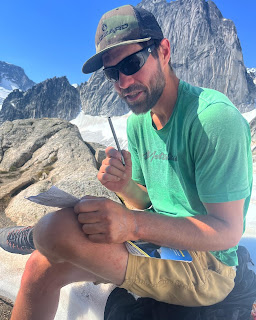Coumadin and INR
The new school of thought is that I should eat a healthy diet and drink alcohol if I want, just as long as I keep things consistent.
When deciding to go with a mechanical Aortic Valve, I knew there was going to be some compromise. The upside is that, unlike a tissue valve, my new parts should last the rest of my life. This means that I should not ever need another heart surgery! The negative side of this decision is that my body recognizes this new valve as a foreign object and will try to form a clot around it for the rest of my life. In order to prevent this from happening, I take a daily dose of Warfarin.
Basically, Warfarin has been used as a rat poison. When I take my daily dose, it prevents a clotting factor from working in my body. This means that my blood will clot more slowly. Although Warfarin is often referred to as a "blood-thinner," this is inaccurate. My blood is not thinner by any means; it simply does not produce clots as quickly.
When determining how much Warfarin to take, I work with an Anticoagulation Clinic through Kaiser Permanente. When I was first discharged from the hospital, I had to go to the lab every day for about 2 weeks to get blood drawn. What we were looking for was my International Normalized Ratio or INR. My INR represent how much anticoagulant there is in my system. Ideally, I should have an INR of 1.5-2.5, meaning that my blood should clot 1.5 to 2.5 times more slowly than the average person.
So here is where the fun started. At first, my INR was rising very slowly. I left the hospital with an INR of about 1.3, which was too low. In order to keep me safe and make sure I did not clot, I was sent home on Lovenox, an injected anticoagulant that was used to help bridge the time while we waited for me INR to get to "therapeutic levels." This meant I had to have a subcutaneous injection twice a day. This was a negative experience and something that I did not look forward to every day.
Since my INR was raising so slowly, the Anticoagulation Counselor played around with my Warfarin dosage a bit. When I left the hospital, I was taking 7.5mg a day. I was quickly upped to 10mg, 15mg, and then to a whopping 20mg! At this point, I even double checked with my counselor, who insisted that this was normal. Needless to say, with this 20mg dose, my INR sky rocketed to 4.8! I was a little upset about this, since an INR of 4.0 and higher is technically a dangerous place to be. The upside was that I did not need my daily dose of Lovenox anymore, which was nice since my stomach was getting swollen and bruised from all of the injection sites.
At this point, I am starting to get used to life on Warfarin. The most interesting aspect of this medication is that as my diet and activity changes, my INR level changes as well. If I eat foods that are rich in Vitamin K (leafy greens like spinach and kale), my INR will be lower. If I drink alcohol, my INR will be higher. It used to be said that if you are on Warfarin, you cannot drink alcohol or eat leafy greens, for these reasons. This way of thinking is now outdated.
The new school of thought is that I should eat a healthy diet and drink alcohol if I want, just as long as I keep things consistent. As a vegetarian, I eat a good amount of greens, so as I work on keeping my diet consistent, my anticoagulation counselor will continue to work to find the correct dose of Warfarin.
The last thing I will have to get used to while on Warfarin is the fact that if I get cut or injured, I am going to bleed more than usual. I am not too concerned about regular flesh wounds. I should be able to stop this type of bleeding pretty successfully. The things that concern me more are internal bleeds. Since I tend to rock climb a lot, if I get hit on the head and have an intracranial bleed, I would be in more trouble than the average person. I also hear that GI bleeds are more of a concern, but I believe that this is for the elderly and people with pre-existing conditions.
 |
| My usual breakfast. Full of Vitamin K. |
So, at this point, I plan to eat my leafy greens, drink beer occasionally, and always wear a helmet when I climb. I get my INR checked about once a week which will eventually become less frequent. Life on Warfarin doesn't seem too bad.


Hi! I literally have the same thing as you do ! Except I only found out I had this last year when I was 16 and had a balloon valvuloplasty a month after finding out! However unlike you mine wasn't successful due to my valve leaking ! So a year later I had open heart surgery to replace the aortic valve and like you I decided that a mechanical valve was right for me ! However during the surgery my surgeon decided to try repair the valve ! I came out of surgery thinking I never had to go through it again but I was wrong, my surgeon was very pleased with the fact I could go 8 years without further surgery but I didn't share this with him, I was terrified! However 4 weeks post op I had another scan and had the worse news ever, I had to have open heart surgery in months rather than years ! I'm now 5 months post op and still really tired and out of breath, but I still do not need surgery yet, I decided to reconsider my decision regarding which valve to have but your blog had helped me stick to my original plan ! Like you I'm looking forward to getting it sorted but also scared because I suffer from depression because of all this ! Well done for being so brave and you other half is a diamond !!
ReplyDeleteHi! I literally have the same thing as you do ! Except I only found out I had this last year when I was 16 and had a balloon valvuloplasty a month after finding out! However unlike you mine wasn't successful due to my valve leaking ! So a year later I had open heart surgery to replace the aortic valve and like you I decided that a mechanical valve was right for me ! However during the surgery my surgeon decided to try repair the valve ! I came out of surgery thinking I never had to go through it again but I was wrong, my surgeon was very pleased with the fact I could go 8 years without further surgery but I didn't share this with him, I was terrified! However 4 weeks post op I had another scan and had the worse news ever, I had to have open heart surgery in months rather than years ! I'm now 5 months post op and still really tired and out of breath, but I still do not need surgery yet, I decided to reconsider my decision regarding which valve to have but your blog had helped me stick to my original plan ! Like you I'm looking forward to getting it sorted but also scared because I suffer from depression because of all this ! Well done for being so brave and you other half is a diamond !!
ReplyDeleteHi Lauren. That must have been the worst feeling: first to wake up and not have the procedure done that you had hoped for and then to have to re-do the whole thing again! My biggest concern was that I wanted to have one procedure and then to go on with my life. When is your next surgery scheduled? What kind of mechanical valve are you planning on getting?
ReplyDelete